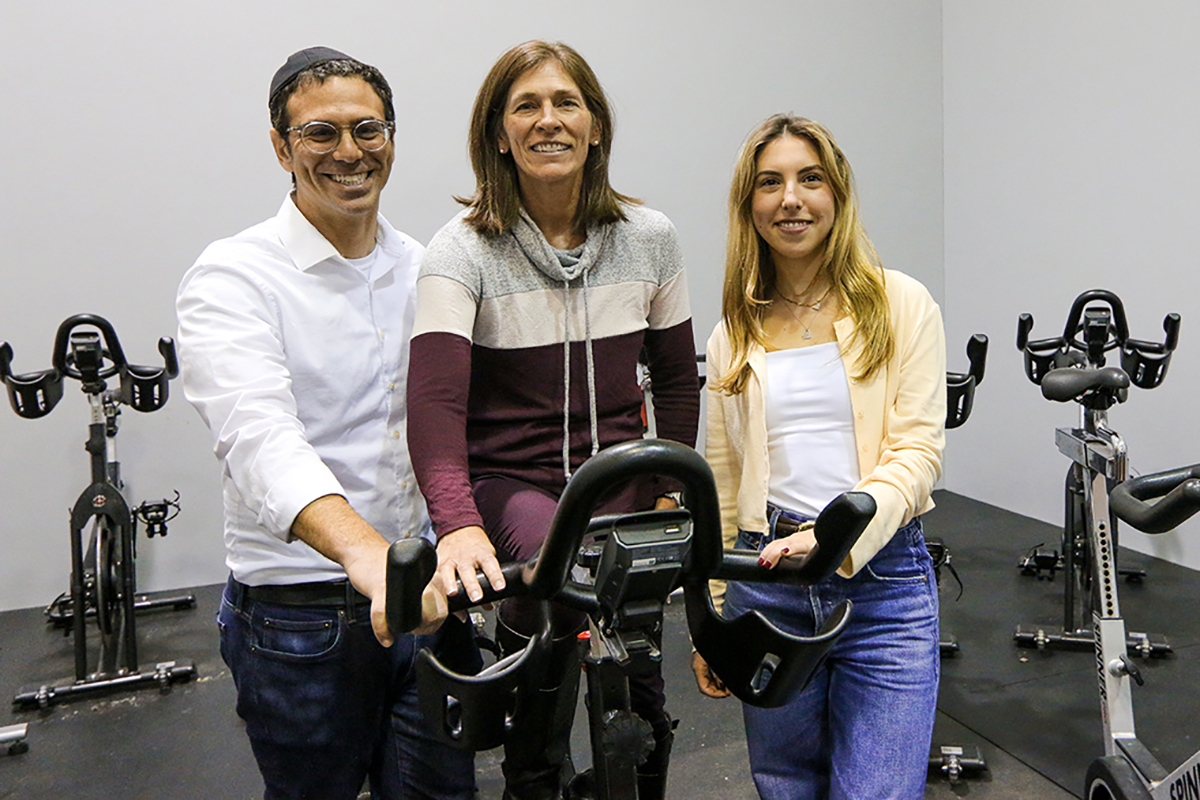
Ira Bedzow, executive director of the Emory Purpose Project; April Flint, senior director for Recreation and Wellness with Emory Athletics; and senior Julia Jarvis will collaborate to lead the “Learning in Motion” course.
Tina Chang
The course, “Learning in Motion: Exploring Holistic Learning,” combines physical activity with reflective dialogue to examine how attention, body movement and social interaction influence learning, emotion and self-understanding. A model for holistic education, the course empowers students to cultivate purpose as a life skill rather than simply an academic subject.
The course’s weekly 50-minute seminars combine structured discussion, reflective exercises and brief readings to stimulate dialogue. Each session pairs moderate intensity cycling with discourse to connect physical experience with intellectual insight.
Students will explore topics such as the impact of exercise on participants’ learning and mood, as well as the role of bias in judgment, self-agency and resilience, friendship and identity, and play, among others.
The one-credit-hour physical education course is the result of a collaboration between the Emory Purpose Project (EPP) and Recreation and Wellness in Campus Life. EPP partners with programs, departments and units across Emory to create opportunities for students to explore ethics, purpose and meaning.
“‘Learning in Motion’ reflects the heart of the Emory Purpose Project — connecting what we think with how we live,” says Ira Bedzow, executive director of the Emory Purpose Project. When students move, reflect and learn together, they discover that purpose is more than an idea to study; it’s an orientation to embody and a skill to practice.”
“The course also helps students recognize the difference between learning about something and learning how to live what they are learning,” he adds.
A collaborative origin story
The course concept emerged from a conversation between Bedzow and one of his students, Julia Jarvis, who was already engaged with Emory Purpose Project programming.
“At the beginning of the school year, Ira and I were discussing our exercise routines — and reflecting on the sense of freedom and clarity that comes with cardio and how it translates into other parts of our lives,” says Jarvis.
“We imagined a space that blends academics and exercise to give Emory students room to play while still inviting discipline — and ultimately, we came to this course.
For Jarvis, a senior majoring in interdisciplinary studies with an ethics minor, the course encourages learning for the sake of learning. She hopes students will gain a deeper understanding of themselves and be reminded that there are countless opportunities to learn outside normal routines.
Jarvis will serve as a teaching assistant for the course. Bedzow will co-teach the course with April Flint, senior director for Recreation and Wellness with Emory Athletics and an assistant professor in the sport management degree program at Kennesaw State University.
Certified to teach indoor spin classes, Flint has extensive experience teaching students about nurturing life skills and seeing the entire world as a classroom, all through the lens of recreation and wellness.
“This is more than a fitness course. It uses movement to enhance thinking, reflection and community. It supports holistic student learning, aligns with well-being goals and offers an innovative model of education,” she says.
“Students will acquire a deeper understanding of the mind-body connection by experiencing how movement shapes cognition, attention and emotion,” Flint adds, explaining that the course also helps students build self-awareness around the impact of physical activity and apply mind-body strategies to support motivation, well-being and resilience.
Bedzow hopes “Learning in Motion” will remind Emory students, faculty and staff that creativity and play are not extras in education; they’re essential to how people learn and grow. When students are invited to learn with their whole selves — mind, body and spirit — they find space for curiosity, connection and genuine transformation.
“We want Emory students to experience learning as something alive and embodied — not just something that happens in their heads or in the classroom,” says Bedzow. “By learning in such a unique way, we hope they will leave the course with a deeper appreciation that opportunities to learn — both about themselves and the world around them — are everywhere.”
